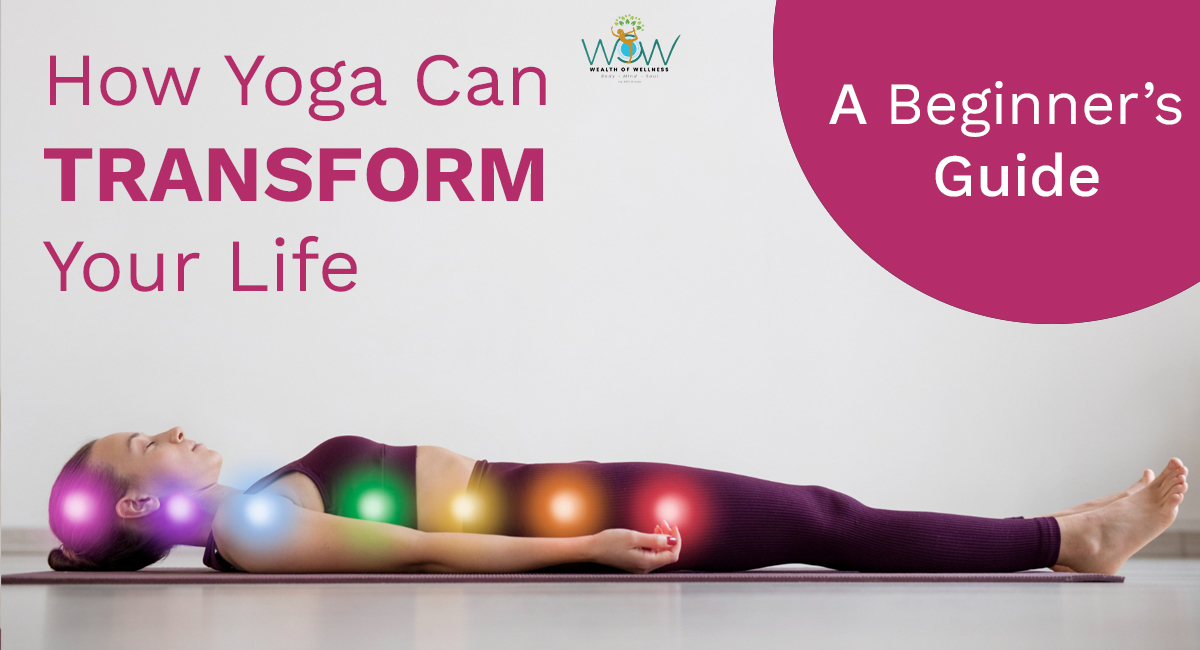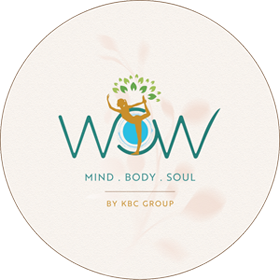
How Yoga Can Transform Your Life: A Beginner’s Guide
Yoga Can Transform Your Life
Yoga is not merely an exercise; it’s a life-transforming practice that harmonises the mind, body, and spirit. Originating thousands of years ago, it became a universal wellness system. Nowadays, it is practiced globally, gaining wide acceptance due to its euphoric effects on health, mental clarity, and emotional well-being. With consistent practice, inner peace, and a deeper sense of self-awareness.
What is Yoga?
Yoga is a holistic discipline that aims at integrating physical postures, breathing techniques, and meditation to achieve a balance in the state of health and mindfulness. While many people associate yoga with stretching or flexibility, it reaches far beyond the physical.
Yoga is a philosophy of life that encourages self-awareness, compassion, and balance. It promotes inner peace, helping practitioners navigate the challenges of modern life with greater resilience and clarity.
In traditional Indian philosophy, yoga is also a spiritual path toward enlightenment. Ancient texts describe yoga as an eightfold path, which includes ethical principles, meditation, and self-discipline. While the spiritual aspect may not appeal to everyone, yoga’s adaptability makes it accessible to individuals of all beliefs and lifestyles.
We offer tailored yoga sessions for everyone’s exclusive needs. Explore more about learning yoga at the wealth of wellness experts to get the most benefit from it.
Types of Yoga
There are several styles of yoga, each catering to different needs, preferences, and fitness levels. Here’s a closer look at some popular types of yoga:
- Hatha Yoga
Hatha yoga is a gentle, foundational practice that focuses on physical postures and breathing techniques. It’s perfect for beginners as it entails slow movements and holding poses to build strength, flexibility, and mindfulness. If you’re new to yoga and want to ease into it, Hatha yoga is an excellent place to start.
- Kundalini Yoga
Known as the “yoga of awareness,” Kundalini yoga focuses on awakening the spiritual energy (kundalini) at the base of the spine. It combines dynamic movements, breathwork, chanting, and meditation to unlock this energy and channel it through the chakras. Kundalini yoga is ideal for those seeking spiritual growth and heightened self-awareness.
- Yin Yoga
Yin yoga is a slow, meditative practice where poses are held for several minutes at a time. This style of yoga targets the deeper connective tissues, ligaments, and joints, cultivating flexibility and relaxation. Yin yoga is great for people seeking to reduce stress, improve joint health, and cultivate patience. It complements more active styles of yoga or high-intensity workouts by balancing the body’s energy.
- Prenatal Yoga
Prenatal yoga is designed for expectant mothers; it involves gentle stretches, breathing exercises, and relaxation techniques. It eases pregnancy-related discomforts, such as back pain and swelling, while preparing a woman’s body for bringing a baby into the world. Prenatal yoga also fosters a deeper connection between the mother and her baby. Always consult your healthcare provider before initiating prenatal yoga, especially if you have a high-risk pregnancy.
If you want to get the most out of it, it is important to understand your body types and your exclusive needs. For more information about detailed yoga sessions explore our yoga retreat program to get your best session for the best results.
Benefits of Yoga
The transformative power of yoga lies in its ability to raise your physical, mental, and emotional health. Here’s a deeper look at how yoga can improve your life:
Physical Benefits
- Increases Flexibility and Strength:
Regular practice stretches and tones muscles, improving flexibility and strength with practice. - Alleviates Chronic Pain: Yoga is effective in reducing pain caused by conditions like arthritis, lower back pain, and fibromyalgia.
- Enhances Respiratory Function: The breathing exercises (pranayama) improve lung capacity and oxygenation.
- Supports Weight Management: Styles such as Vinyasa or Power yoga help burn calories while teaching mindful eating habits.
We have detailed tailored yoga sessions to get the best physical benefits. Explore more about our yoga sessions for physical benefits.
Mental Benefits
- Reduces Stress: The mindfulness and relaxation emphasis in yoga lowers cortisol, the stress hormone.
- Relieves Anxiety and Depression: The meditation and breathing techniques create a sense of calm, relieving symptoms of anxiety and depression.
- Improves Focus and Clarity: By calming the mind, yoga improves focus and mental clarity.
Emotional and Spiritual Benefits
- Promotes Emotional Balance: Yoga fosters self-awareness, helping you manage emotions and cultivate resilience.
- Deepens Self-Connection: Through introspection, yoga encourages a greater understanding of yourself and your purpose.
Long-Term Health Benefits
- Lowers Risk of Heart Disease: Yoga helps lower blood pressure, improves cholesterol levels, and improves heart health.
- Improves Sleep Quality: Practices such as Yoga Nidra (yogic sleep) help to fight insomnia and bring on restorative sleep. For better sleep, you can explore our sleep well retreat.
- Enhances Quality of Life: From boosting energy levels to fostering a positive outlook, yoga enhances every aspect of life.
If you are seeking yoga for your emotional wellness and spiritual wellness, explore our detailed designed yoga sessions to achieve your goals faster and hassle-free. In our special spiritual wellness program, you can achieve your wellness via satsang, sadhu board, mantra and meditation.
Who Should Practice Yoga?
Yoga is highly adaptable and can be practised by anyone, regardless of their walk of life. Here’s a breakdown of who can benefit:
- Busy Professionals: It helps in reducing work-related stress and improving focus.
- Elderly People: Gentle yoga styles enhance mobility, balance, and overall vitality.
- Expectant Mothers: Prenatal yoga supports physical and emotional well-being during pregnancy.
- Children and Teens: Yoga enhances posture, concentration, and emotional well-being.
Whether you’re a beginner or an experienced practitioner, yoga offers something for everyone.
How to Start Yoga
Starting a yoga practice can be both exhilarating and fulfilling. Here’s a step-by-step guide to get you started:
- Research and Set Goals
Identify your goals be it stress relief, flexibility, or spiritual growth. Knowing what your goals are will direct your practice.
- Find the Right Resources
Research local yoga studios, online classes, or yoga apps to discover beginner-friendly sessions. Find instructors who are certified and can safely guide you.
- Pack Basics
Invest in a good-quality yoga mat, comfortable clothing, and any necessary props like blocks or straps.
- Establish a Routine
Start small by practising for 15-20 minutes a day, gradually increasing the duration. Consistency is key to getting the benefits of yoga.
- Practice Mindfulness
Incorporate meditation and breathwork into your practice to enhance the mental and emotional benefits of yoga.
- Be Patient
Progress in yoga is gradual. Enjoy the journey; don’t work to quickly achieve difficult postures.
- Find Community Support
Join a yoga group or attend workshops to interact with like-minded people and get motivated.
For more information about Yoga, and want to achieve overall wellness? Which yoga should you start with? Which one would be convenient and easy for you? Explore our range of wellness services to get the benefits of yoga.
Conclusion
Yoga is not merely a physical exercise; it’s a transformative journey toward a healthier, happier, and more mindful life. Its benefits extend beyond the mat, influencing how you think, feel, and interact with the world. Whether you are seeking to reduce stress, manage a health condition, or simply find inner peace, yoga has the power to transform your life.
So roll out your mat, take a deep breath, and embark on this beautiful journey. Remember, yoga is for everyone- no matter what age, fitness level, or experience. Start where you are, and let yoga lead you to a more balanced and fulfilling life.
FAQs
Do I have to be flexible to start yoga?
Not really! Flexibility is not a prerequisite for yoga; it’s a benefit that comes with regular practice. Yoga is about meeting your body where it is today and gradually improving your strength and flexibility over time. Start with beginner-friendly poses, and listen to your body to avoid overexertion.
How often should I practice yoga as a beginner?
It’s better to start small and be consistent. It’s perfect for beginners to practice yoga 2-3 times a week for 15-30 minutes. As you become more comfortable, you can gradually increase the duration and frequency of your sessions. Even just a few minutes a day can make a big difference.
What should I wear and bring to a yoga session?
Wear comfortable, stretchy clothes that allow free movement, such as leggings, shorts, or a T-shirt. A yoga mat is essential to provide grip and cushioning. For beginners, props like yoga blocks or straps can be helpful to support poses. If you’re attending a class, bring a water bottle and a small towel for added comfort.
Can yoga help with stress and anxiety?
Yes, yoga is highly effective in managing stress and anxiety. Its combination of deep breathing, mindful movement, and meditation helps calm the mind and reduce cortisol levels (the stress hormone). Practices like Yin yoga or Hatha yoga are especially beneficial for relaxation and emotional balance.
How does meditation help with pregnancy sleep issues?
Meditation can be extremely effective in dealing with sleep disturbances during pregnancy. Its good effects result from the calming of the nervous system, reduction of anxiety, and increased mindfulness. Pregnancy is often accompanied by increased stress levels or racing thoughts at night, which can easily make it difficult to relax at sleep time. Deep breathing, therefore, through the practice of meditation, encourages low heart rates and releases tension from the body. The effects of guided meditation or mindfulness create a sense of relaxation, making it easy to fall and remain asleep.


